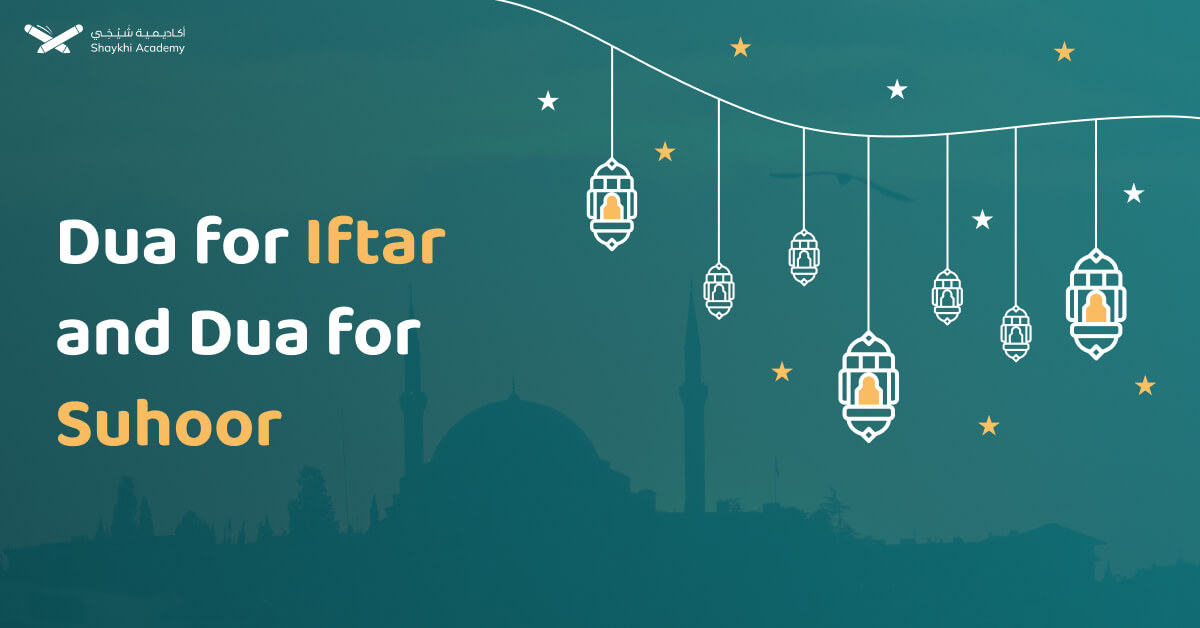The Dua for Iftar (dua fir breaking fast), and the Dua for Suhoor (pre-dawn meal) hold special significance in the practice of Ramadan, the holy month of fasting for Muslims worldwide. These supplications serve as moments of spiritual reflection and gratitude, acknowledging Allah’s mercy and provision.
These supplications express thankfulness to Allah for sustenance and seek forgiveness, acceptance of deeds, and protection from evil. The Dua for Suhoor, recited before the pre-dawn meal, seeks strength, sustenance, blessings, and forgiveness for the fasting day ahead.
Dua for Breaking Fast
The dua for breaking the fast is a significant supplication that the Prophet Muhammad ﷺ used to recite upon completing his fast. It reflects gratitude to Allah for providing sustenance and acknowledges the spiritual and physical effects of fasting. One of the well-known duas narrated by Abdullah ibn Umar (may Allah be pleased with him) is:
ذهب الظمأ وابتلت العروق وثبت الأجر إن شاء الله
Transliteration: Dhahaba al-zama’u wabtalati al-‘urooqu wa thabata al-ajru in sha’ Allah.
Translation: “The thirst has gone, the veins are moistened, and the reward is assured, if Allah wills.”
Additionally, the Prophet ﷺ would also say:
اللهم إنّي أسألُكَ برحمتِكَ التي وسِعَتْ كلَّ شيءٍ أن تغفِرَ لي
Transliteration: Allahumma inni as’aluka birahmatika allati wasi‘at kulla shay’in an taghfira li.
Translation: “O Allah, I ask You by Your mercy, which encompasses all things, to forgive me.”
It is recommended for a fasting person to make dua at the time of iftar, as this is one of the moments when supplications are accepted. The Prophet ﷺ said:
“Three supplications are never rejected: the supplication of a parent for his child, the supplication of a fasting person, and the supplication of a traveler.” (Tirmidhi, authenticated by Al-Albani).
Moreover, when breaking his fast at someone’s home, the Prophet ﷺ would pray for them, saying:
أفطرَ عندَكمُ الصَّائمونَ، وتنزَّلت عليْكمُ الملائكةُ، وأَكلَ طعامَكمُ الأبرارُ، وغشيتْكمُ الرَّحمةُ
Transliteration: Aftara ‘indakumus-saa’imoon, wa tanzalat ‘alaykumul-mala’ikatu, wa akala ta‘amakumul-abraru, wa ghashiyatkumur-rahmah.
Translation: “May the fasting people break their fast with you, may the angels descend upon you, may the righteous eat your food, and may mercy envelop you.”
These duas highlight the importance of gratitude, seeking forgiveness, and making supplications at the blessed moment of iftar. It is a time to connect with Allah and ask for His mercy, blessings, and acceptance of one’s fast.
1- Seeking Blessings of the Day:
This dua seeks Allah’s blessings for the remainder of the day after breaking the fast, and seeks Allah’s approval and acceptance.
The Dua: اللهم لك صمت وعلى رزقك أفطرت، فتقبل مني
Its transliteration: Allahumma laka sumtu wa ‘ala rizqika aftartu, fa taqabbal minni.
Its translation: O Allah, for You I have fasted, and with Your provision, I break the fast, so accept it from me.
2- Seeking Acceptance of Deeds:
This Dua asks Allah to accept the fasting and good deeds performed during the day.
The Dua: اللهم تقبل صيامي وقيامي وصالح عملي
Its transliteration: Allahumma taqabbal siyami wa qiyami wa salih ‘amali.
Its translation: O Allah, accept my fasting, my standing in prayer, and my righteous deeds.
3- Seeking Relief from Thirst:
This dua expresses gratitude for the relief from thirst and the ability to break the fast, and asks Allah to reward them for their fasting.
The Dua: ذهب الظمأ، وابتلت العروق، وثبت الأجر إن شاء الله
Its transliteration: Dhahaba al-zama’u, wa abtalat al-‘urūq, wa thabata-l-ajru in shā’ Allāh.
Its translation: The thirst has gone, the veins are moistened, and the reward is certain, if Allah wills.
4- Seeking Protection from Evil:
This dua seeks Allah’s protection from evil after breaking the fast, and to be safe and sound from anything harmful that the Iftar might consist of.
Arabic: اللهم إني أعوذ بك من شر ما أفطرت منه
Its transliteration: Allahumma inni a’udhu bika min sharri ma aftartu minhu.
Its translation: O Allah, I seek refuge in You from the evil of what I have broken my fast with.
5- Seeking Acceptance of Deeds:
This Dua asks Allah to accept the fasting and worship performed during Ramadan.
The Dua: اللهم تقبل مني، إنك أنت السميع العليم
Its transliteration: Allahumma taqabbal minni, innaka anta-s-samī’u-l-‘alīm.
Its translation: O Allah, accept from me, for You are the All-Hearing, the All-Knowing.
The Dua before breaking fast in Ramadan:
The moment of iftar is considered a special time when prayers are more likely to be accepted, as the fasting person has shown patience and dedication throughout the day.
To be able to recite the following Duas in Arabic in a correct manner, many Muslims join an Arabic course that pays attention to how to recite Duas; such as the Fusha Arabic course at Shaykhi Academy.
1- Dua for Seeking Forgiveness and Acceptance:
This Dua asks Allah for forgiveness and the acceptance of deeds before breaking the fast.
The Dua: اللهم إني أعوذ بك من عذاب جهنم، وأعوذ بك من عذاب القبر، وأعوذ بك من فتنة المحيا والممات، وأعوذ بك من فتنة المسيح الدجال
Its transliteration: Allahumma inni a’udhu bika min ‘adhabi jahannam, wa a’udhu bika min ‘adhabi-l-qabr, wa a’udhu bika min fitnati-l-mahya wa-l-mamat, wa a’udhu bika min fitnati-l-masih ad-dajjal.
Its translation: O Allah, I seek refuge in You from the punishment of Hellfire, the torment of the grave, the trials of life and death, and the trial of the False Messiah.
2- Dua for Seeking Sustenance and Guidance:
This Dua asks Allah for sustenance, guidance, and protection in all aspects of life before breaking the fast.
The Dua: اللهم إني أسألك خير هذا اليوم: فتحه، ونصره، ونوره، وبركته، وهداه
Its transliteration: Allahumma inni as’aluka khayra hadha al-yawm: fathahu, nasrahu, nurahu, barakatahu, wahdahu.
Its translation: O Allah, I ask You for the goodness of this day: its opening, its victory, its light, its blessings, and its guidance.
3- Dua for Seeking Allah’s Mercy:
This Dua seeks Allah’s mercy and forgiveness before breaking the fast.
The Dua: اللهم إني أسألك برحمتك التي وسعت كل شيء أن تغفر لي
Its transliteration: Allahumma inni as’aluka bi-rahmatika allati wasi’at kulla shay’in an taghfira li.
Its translation: O Allah, I ask You by Your mercy which encompasses all things, to forgive me.
4- Dua for Seeking Forgiveness and Mercy:
This Dua seeks Allah’s forgiveness and mercy upon breaking the fast.
The Dua: اللهم إني أسألك رحمة تغشى كل شيء، فاغفر لي
Its transliteration: Allahumma inni as’aluka rahmata taghsha kulla shay’, faghfir li.
Its translation: O Allah, I ask You for mercy that encompasses all things, so forgive me.
5- Dua for Seeking Protection from Hellfire:
This Dua seeks Allah’s protection from the Hellfire after breaking the fast.
The Dua: اللهم إني أعوذ بك من عذاب القبر، وأعوذ بك من عذاب جهنم، وأعوذ بك من فتنة المحيا والممات، وأعوذ بك من فتنة المسيح الدجال
Its transliteration: Allahumma inni a’udhu bika min ‘adhabi-l-qabr, wa a’udhu bika min ‘adhabi jahannam, wa a’udhu bika min fitnati-l-mahya wa-l-mamat, wa a’udhu bika min fitnati-l-masih ad-dajjal.
Its translation: O Allah, I seek refuge in You from the punishment of the grave, and from the punishment of Hellfire, and from the trials of life and death, and from the trial of the False Messiah.
When should you say the dua for breaking fast?
The moment of breaking fast, known as Iftar, is a sacred time in Ramadan, and saying dua at this moment holds great significance in Islam. Saying dua at the time of breaking fast serves as a reminder of the importance of gratitude, faith, and reliance on Allah in the life of a believer.
Tutors at Shaykhi Academy!
Enroll today in our Online Quran Recitation Course at Shaykhi Academy. Whether you’re a beginner or looking to improve your Tajweed, our course offers comprehensive guidance from qualified instructors.
Learning how to perform Dua properly is very important, and one way to do so is through Shaykhi Academy’s Islamic Studies courses, in which tutors attempt to teach students the Dua for breaking fast in English as a preparatory step for learning the Dua for breaking fast in Arabic.
Join a supportive online community and embark on a transformative journey with the Quran. Don’t miss this opportunity to enhance your recitation skills and deepen your connection with the Holy Quran. Register now!
Why Choose Shaykhi Academy?
- Connect with highly qualified native tutors.
- Flexible scheduling to suit your busy lifestyle.
- Affordable classes tailored for all levels.
- Accessible from anywhere around the globe.
Discover Our Range of Courses:
- Arabic Noorani Qaida: Lay a solid foundation for Quranic studies.
- Online Quran Classes for Kids: Engaging lessons for lifelong learning.
- Tajweed Rules for Kids: Learn to recite with confidence.
- Quran Hifz for Kids: Step-by-step guidance to memorize the Quran.
- Quran for Adults: Introduce yourself to Quran reading and Tajweed rules.
- Online Arabic Courses: Master the language of the Quran.
- Islamic Studies: A wide range of topics related to Islam, including theology, law, Quranic studies, Hadith.
Don’t Miss Out on Your Chance to Excel!
Whether you’re a beginner or seeking advanced knowledge, Shaykhi Academy can guide you! Book your free trial now and make Ramadan 2024 your Quranic turning point!

Conclusion:
The Dua of Iftar marks the end of the day’s fast, expressing thankfulness for sustenance and seeking forgiveness and blessings. Conversely, the Dua of Suhoor is recited before the fast begins, asking for strength, guidance, and acceptance of worship during the day ahead.
Reciting these supplications with sincerity enhances the spiritual benefits of fasting and fosters a deeper connection with the Divine. Educational resources like Shaykhi Academy provide opportunities for Muslims to learn and understand these Duas, enriching their spiritual practice and strengthening their relationship with Allah.

















































